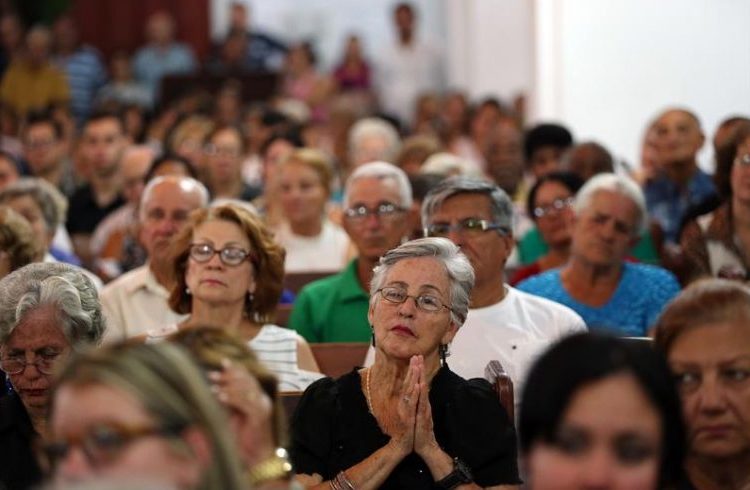A modest bunch of flowers cut from a garden and a lit candle were her offering to Our Lady of Charity. Kneeling at her feet and with her eyes full of tears, she asked for the eternal rest of the victims and prayed for the comfort of those who today are crying over the loss of a son or daughter, brother or sister, a friend, after the disastrous takeoff of May 18.
The image is repeated once and again in Holguín’s San Isidro Cathedral, where on the night of Tuesday the 22nd a mass was given to pay homage to the deceased and to pray for the health and recovery of Maylén Díaz Almaguer and Emiley Sánchez De La O, Holguín survivors of the disaster. The mass was presided over by Monsignor Emilio Aranguren, president of the Conference of Catholic Bishops of Cuba and Bishop of Holguín, the city of origin of 67 of the victims.
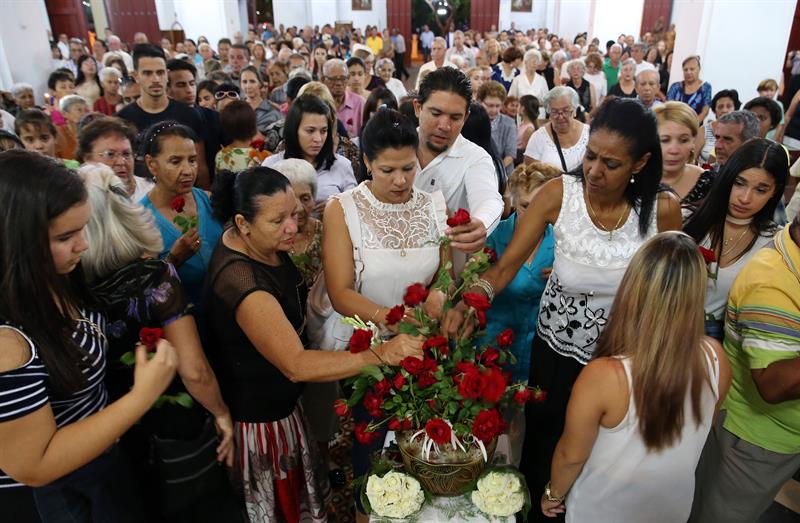
“There is a beautiful text in a document of the Second Vatican Council that says that men’s joys are the Church’s joys, and in the same way men’s sorrows and sadness are also the Church’s sorrows and sadness, because nothing human can be alien to us. In the face of pain one doesn’t notice if the persons have faith or not, what matters is the pain and it’s necessary to approach the persons who are heartbroken to console them. One consoles with words, with gestures and for us as Christians we also console with prayer,” the high-ranking ecclesial authority said.
“That is precisely what we have done tonight. We first say a holy rosary to Our Lady who knew of human suffering in the suffering of her son Jesus Christ. Then we took the holy communion to pray for the eternal rest of those who died and also for Our Lord Jesus Christ to give strength to those who lost their loved ones. We especially pray for those who remain unprotected, that is to say the orphaned children, the persons who are left without support, who perhaps lost the son or daughter who maintained them, or perhaps a nephew or niece who took care of the family,” he added.
“These have been four days in which not only the sorrow has united us but rather it has also fraternized us, because we are beyond many schemes that are sectored in daily life. This so terrible tragedy has united us all, sectors have been left aside and we are in the presence of fraternity because we are fellow citizens, and that is what has been demonstrated,” he commented to OnCuba.
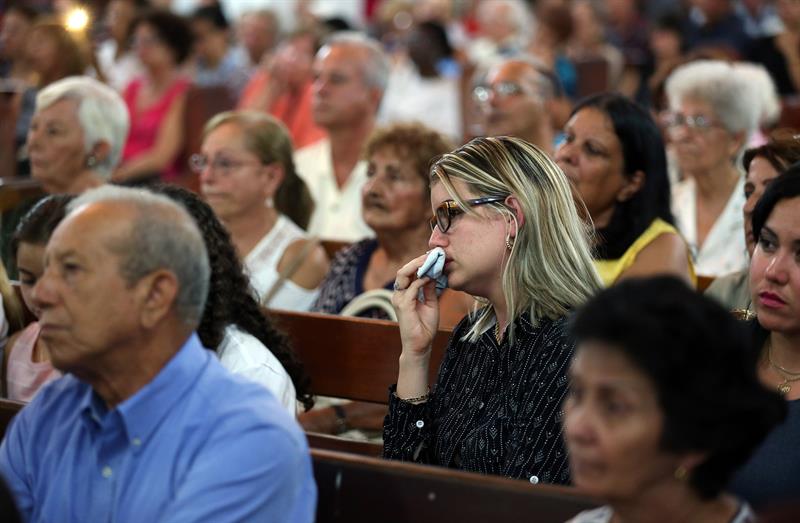
Ten El Nazareno Christian denomination couples lost their lives in the accident. In your homily you spoke of the ecumenical sense that must unite all men and women of faith….
Father Víctor Larrúa, who is the priest of the Parish of Vista Alegre, the Holguín district where the central venue of Los Nazarenos is located in the province, was present at the mass. He was a personal friend of the pastors from that temple, that’s why Larrúa concelebrated this mass together with us and the city’s priests.
We prayed because like us Catholics, they also have faith in the resurrection and we can turn to that faith to mutually console ourselves, and as I said in the homily, I recognized that the Superintendent of this denomination had spoken of a dozen children who were left orphaned.
This undoubtedly is a moment of sorrow, but at the same time it is a moment of grace because we have come together in the most dignified sense of ecumenism. I believe it’s not a question of establishing differences between one religion or another, but rather that we all as brothers and sisters feel the sorrow as ours and that we pray for those children, those mothers and fathers, those brothers and sisters who today feel the void left by the death of a loved one. I believe that this experience has shown us that the ecumenical sense allows us to reap good fruits.
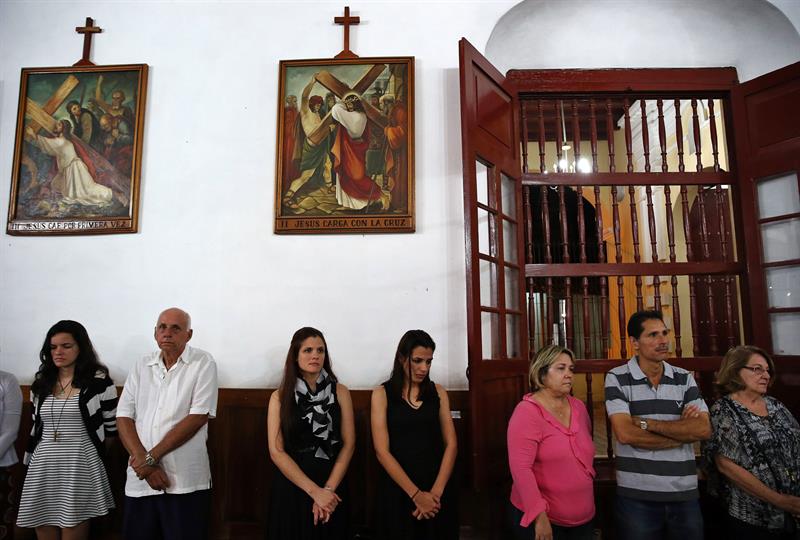
Monsignor, how do you assess the solidarity of Cubans and especially the people of Holguín as this time?
I believe it is something that is part of our culture, of our idiosyncrasy. That is very important: that even if I don’t know you, I support you. In the life of a town, a neighborhood, being close is something that is truly expressed with facts, and it is what is being seen these days in the funeral parlors, what we have even seen in cultural institutions that have placed their spaces for funeral services because the funeral parlors can’t cope.
It is something deeply sentimental but not of a superficial sentiment, I believe that they are gestures that have come from the hearts of men and women, of placing at your disposition what they have to demonstrate that your sorrow is also mine. And not only this, you have to see how the people come en masse to the wakes to comfort the relatives of the victims even though they don’t know them, to tell them: “I am here sharing your sorrow.”
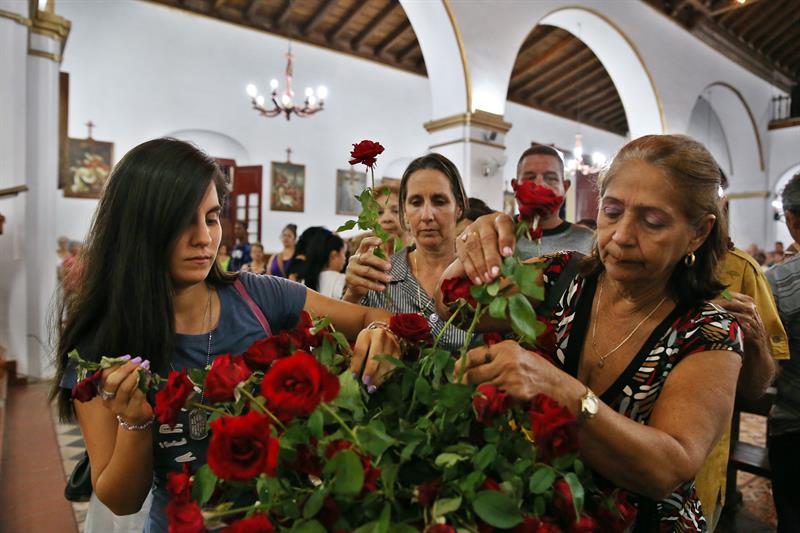
What is your message on behalf of the Conference of Catholic Bishops of Cuba to those relatives who today are grieving?
After the unfortunate event Pope Francis sent a message and it was not an act of courtesy or of politeness. I can say for sure that the Holy Father prayed for these families, prayed for Cuba, and I would even say that he surely recalled his visit to Holguín.
What I can add is that we maintain that sensitivity that is so much a part of us Cubans, and that we love and care for life as the biggest gift God gives us.
I urge all Cubans that we continue united at this hour of sorrow and I am thankful on behalf of the Church for any gesture of love and respect for those who are suffering. We must thank God for maintaining that sensitivity in the life of our people.
The urns with the ashes of the victims started arriving on Sunday to their final resting places. Photo: Alejandro Ernesto / EFE.

